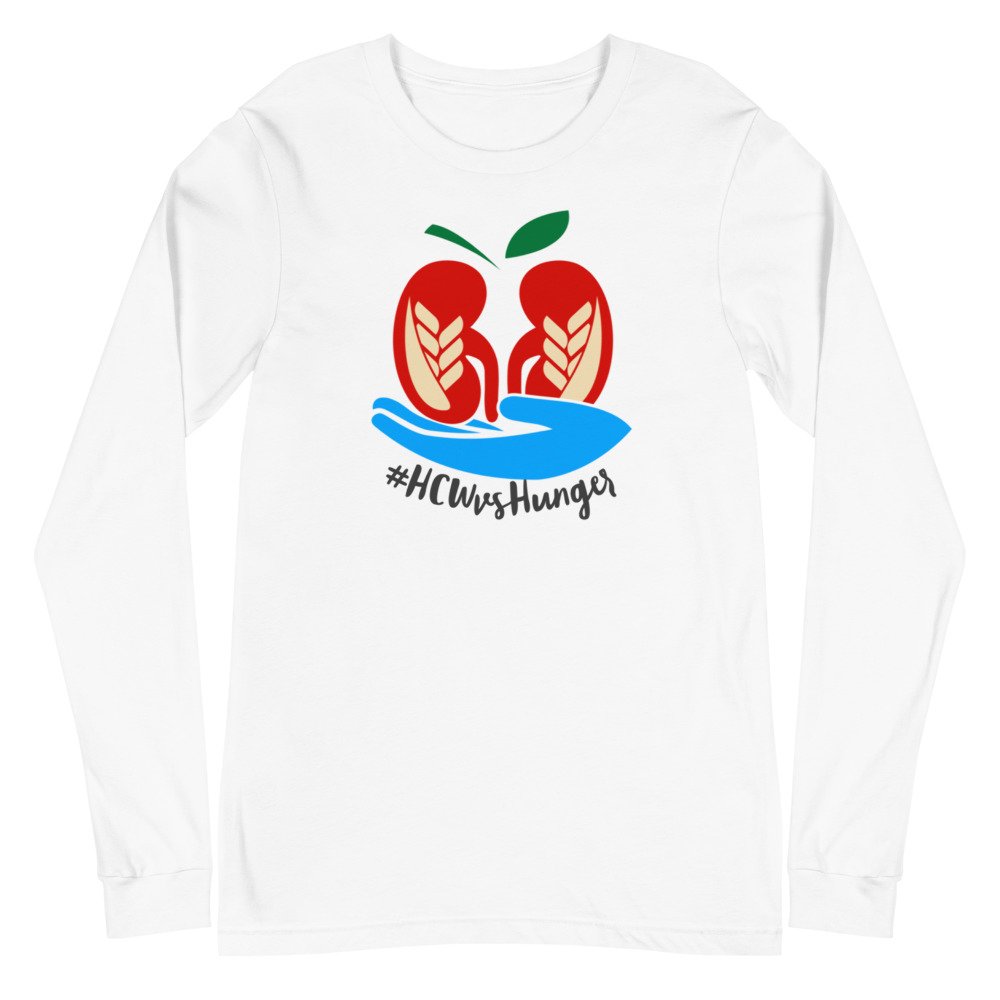From Thanksgiving Day through Dec 3rd, donations made to any hunger-relief organization can count toward our team total #UrineItToWinIt!
Visit the HCWvsHunger website for more information on how to donate
Worldwide, over 260 million people are living in crisis because of hunger. The USDA estimates that 30 million Americans (including 12 million children) experience food insecurity. Food insecurity is a lack of consistent and socially acceptable access to enough safe food for an active, healthy life (USDA). Millions of people in America are just one job loss, missed paycheck, or medical emergency away from experiencing hunger.
Food insecurity in CKD and ESKD
Why should food insecurity matter to nephrologists? Food insecurity is an essential social determinant of health (SDOH) with significant implications, including poorer overall levels of health, chronic medical conditions, and lower levels of psychosocial and physical functioning (RFN post by @mcstarr1). Food insecurity is recognized as a risk factor for chronic kidney disease (CKD) as well as for progression to end stage kidney disease (ESKD). A 2014 cross-sectional cohort analysis of lower-income participants in National Health and Nutrition Examination Survey (NHANES) and Healthy Aging in Neighborhoods of Diversity across the Life Span (HANDLS) study showed food insecurity may contribute to disparities in kidney disease, especially among those with diabetes or hypertension (Crews et al., Am J Nephrol 2014). A follow-up 2017 cross-sectional cohort analysis of similar participants of NHANES linked with Medicare ESRD Registry demonstrated that food insecurity was a risk factor for developing ESKD, independent of demographics, income, kidney markers (e.g. baseline eGFR and albuminuria), and clinical risk factors. (Banerjee et al., AJKD 2017). A 2024 cross-sectional study found that adults with unfavorable SDOH of food insecurity were more likely to have advanced stage cardiovascular-kidney-metabolic sydrome (Zhu R et al, Jama NetwOpen 2024) .
Figure 1 from (Banerjee et al., AJKD 2017) Cumulative incidence for risk of ESKD by food insecurity status in the CKD group (Panel A) and the non-CKD-group (Panel B). Red = food insecure, Blue = food secure
Several barriers to food security exist in patients with kidney disease -- common themes are challenges with restricted diet and available food, identifying and accessing community resources, and not qualifying for support programs (Starr et al., Prev Med Rep 2018). Many nephrologists (and healthcare workers across all specialties) have seen patients who make the unfortunate trade-off to forego medications in order to afford food. The economic disruption of the COVID-19 pandemic has exacerbated social disparities which are associated with more rapid progression of CKD (Crews and Purnell, JASN 2020; Nguyen et al., JAMA ON 2021). The burden of pandemic-related disruptions has led to decreased access to healthy foods for many in racial/ethnic minorities and in socially disadvantaged populations, raising the importance of understanding disparities in treatment initiation for kidney failure during the pandemic.
What can social media do?
In 2020 a tweet from the Shematologist (@acweyand) became a call to action for health care workers who wanted to contribute to the fight against hunger.
And who doesn’t love a friendly competition?
As the call spread across social media, more and more health care workers donated to local, national, and international hunger-relief charities. All told, in less than 10 days over 360,000 USD were donated in 2020! The top team raised over 90,000 USD which provided more than 900,000 meals where they were greatly needed.
“HCWvsHunger is a way for social media to bring us all together, in common purpose, to bring joy and competitive spirit to our community, while putting food on the tables of those who need it most. Social media at times can be so divisive but fighting hunger is a cause we can all get behind.” - Angela Weyand, MD
What can #NephTwitter and #NephSky do to help?
This year @HCWvsHunger is again calling healthcare workers to action for the 2024 #HCWvsHunger hunger-relief campaign. Teams of healthcare workers will again compete to see which team can raise the most money to combat food insecurity. Starting November 28, donations made to any hunger-relief organization can count toward team totals. Visit the HCWvsHunger website for more information on how to donate.
Want to help? The Nephrology team name is #UrineItToWinIt., and this year we are joined by some Rheumatology and Dermatology colleagues. Use team hashtag as well as #HCWvsHunger to spread the word and let everyone know you’ve contributed. The competition ends December 3rd.





